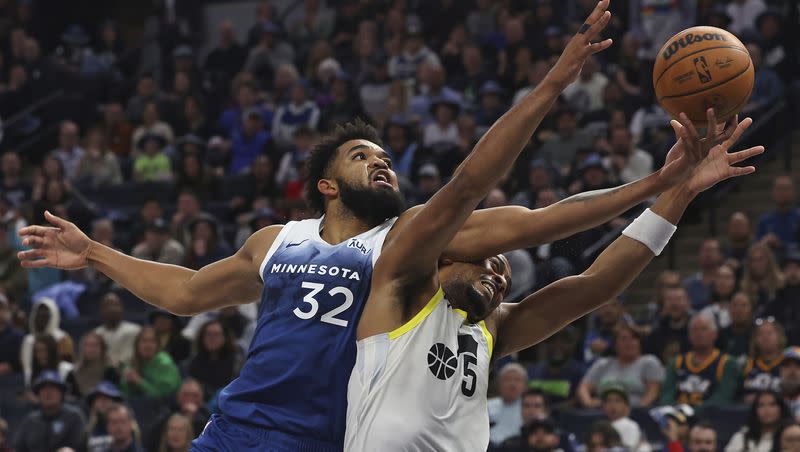The Utah Jazz’s offense is in trouble, but it can be fixed

MINNEAPOLIS — Well, I’ve got good news and I’ve got bad news.
I’ll give you the good news first. Lauri Markkanen is still good at basketball.
The bad news is the Utah Jazz’s offense and defense are both in a bad place.
After a 123-95 blowout loss against the Minnesota Timberwolves on Saturday night, it was made abundantly clear that this team has a lot of work to do.
“Credit to the Timberwolves, they played way better than we did,” Jazz head coach Will Hardy said. “We’ve got to continue to try to find some connectivity in terms of doing what we want to do on both ends of the floor for longer.”
Related
There is still a part of me that wants to allow things to unfold and give this team a chance to build chemistry before forming wholesale opinions.
But then I remember that last year’s Jazz team didn’t know each other at all and had a lot less familiarity and continuity on the roster and early in the season they didn’t look nearly as disjointed as this team.
It might be a bad idea to compare the teams, but I feel like it’s what we’re all thinking at this point. So tonight, I want to talk about some offensive problems.
Not playing to their strengths
The Jazz look their best when they are moving the ball and operating in pick-and-roll and pick-and-pop situations that take advantage of their strengths.
Markkanen is an incredible pick-and-pop player and so is Kelly Olynyk, John Collins is very good as a roller and lob threat and the Jazz’s guards generate enough attention as drivers that it leaves guys open beyond the arc on nearly every play.
This isn’t a list of every offensive strength the Jazz have, but it’s enough to highlight the fact that the Jazz move away from their strengths even when they don’t need to.
You run into some serious problems though when guards putting pressure on the rim becomes the one and only priority of the players on the court.
If the strength of guys like Talen Horton-Tucker and Collin Sexton is to draw defenses in because of their superior first step, the second part needs to be the ability to take advantage of those moments.
When THT is pressuring the rim and using screens to make good passes, it's great. But too often we've become used to seeing stuff like this.
Look at how open guys are... pic.twitter.com/9wvz5TalsI— Sarah Todd (@NBASarah) November 5, 2023
I’ll give Horton-Tucker credit where it’s due — he has taken greater care in passing the ball, especially in situations where he plays within an offensive action. But when he puts his head down, he often ends up flailing among the trees instead of planning to kick the ball out to an open shooter.
You run into even more problems when guys like Olynyk, who shot 39.4% from 3 last season, are passing up open looks.
“There are some possessions where the ball gets swung and the game is telling you to be the person to shoot,” Hardy said. “There usually aren’t two good shots that you’re gonna find in 24 seconds, so if you find one, you need to take it.”
I asked Will Hardy what he wants from Kelly Olynyk on offense. It was simple — be more of a playmaker and shoot when he's open.
So here we have good Kelly, followed by not good Kelly. pic.twitter.com/iMewNRaIhb— Sarah Todd (@NBASarah) November 5, 2023
Olynyk does not have the fastest release in the world, but he should trust his shot more than he has been, and even more so when the ball comes to him off an offensive board.
I want to be clear in saying that the Jazz’s offensive problems are not solely due to Horton-Tucker and Olynyk.
Walker Kessler has clearly struggled this season, Sexton is guilty of the same things that Horton-Tucker is, the spacing with Collins still needs to be figured out and optimized, Jordan Clarkson hasn’t shot the ball as well as he would like, and I could probably say something about nearly everyone else on the roster.
My intention is not to put blame on the two players that I’ve highlighted here, but rather to highlight the idea that the Jazz players are making their flaws the loudest part of their games rather than just playing for each other.
If the Jazz were taking only good shots and just missing everything, resulting in losses, we’d be having a very different discussion, but that’s not what is happening.
Instead, the Jazz are forcing themselves into bad, late-clock situations because they aren’t taking the best — and often easiest — path forward.
These are not difficult fixes. Players can be more assertive, players can be more willing to pass and they can play based on the actions that are practiced. Obviously basketball can’t be scripted, and there always going to be mistakes and missteps, but the Jazz don’t have to have as many as they currently do.

